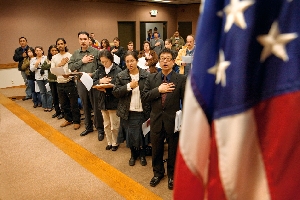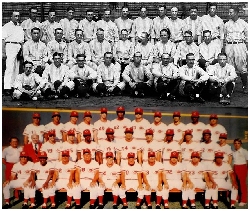- It's bad business, but does anyone care anymore?
 Customer Service is generally regarded as the "front-line" for any business. It is their responsibility to service the customer, answer questions, expedite problems and keep the customer happy, thereby encouraging repeat business. It is intended to make money, not lose it. At least, in theory, that is what it is supposed to be.
Customer Service is generally regarded as the "front-line" for any business. It is their responsibility to service the customer, answer questions, expedite problems and keep the customer happy, thereby encouraging repeat business. It is intended to make money, not lose it. At least, in theory, that is what it is supposed to be.
Not long ago we decided to switch banks, which is no small decision for any company to make. We had grown weary of how our old bank was "nickel and diming" us to death on frivolous charges. Even though we would call to complain, they were slow to correct problems. Such incidents occurred so frequently we decided to take our business elsewhere, but before doing so we gave the bank one last chance by telling them if these trivial matters didn't cease we would be forced to withdraw our account from their bank, to which the customer service rep said indifferently, "Okay." We then exited stage right and opened a new account in another bank which we have been pleased with so far.
A few months after we moved, a manager from the old bank called to say he noticed we had moved our account and what they could do to get our business back. We politely told him it was too late, but he should look into getting some new customer service reps.
A similar incident happened with our garbage collection service. Their rates slowly rose to a point where we started to look for another less expensive service. We called our current service and talked to a customer service rep to ask what they could do about lowering their rates. She wouldn't budge. We said we then had no alternative but to go with another service, to which she said "Okay" and hung up. Again, about a month after we canceled the service, a manager called to ask why we had left them. We explained the problem and the response from his customer service rep.
I have a friend who is a sales manager for a large distributor of industrial supplies. He primarily hustles around the area meeting new customers and checking on existing ones. After a customer is established, they can call in orders, large or small, to the main office who should promptly process and ship accordingly. One day, late on a Friday afternoon, a customer called in a small order for a box of tape. Since it was late in the day on the last day of the work week, the customer service rep figured the order could wait until Monday morning. He thought wrong. The box of tape, as innocuous as it seemed, was actually very much needed by the customer. When he didn't get it in time, he became very upset and the company lost the customer forever. This did not sit well with my friend who had to discipline the customer service rep for the snafu.
Customers do not like to be taken for granted. They want to be assured their best interests are being maintained by their vendors. From this perspective, "Okay" is not okay. The only excuse for indifference in customer service is when the customer is becoming more trouble than he is worth. Even then, he may affect sales simply from a reference point of view. This also means maintaining the status quo will not suffice. Regardless of the policies and procedures in place, customer service reps need to go beyond the call of duty to keep the customer happy. It is what we used to call "hustle." In other words, they cannot afford to go on automatic, but rather think and take charge of the situation.
Let me give you an example, a few years ago I was flying on American Airlines from Tampa to Seattle, with a connection in Dallas. This was an important business call as I had a sales presentation to make. Understandably, I became upset when the Tampa flight left unexpectedly late. As I arrived in Dallas, I realized I was going to miss my connecting flight. Consequently, I was instructed to get in line to talk to a customer service agent, a line which moved painfully slow and my temper began to rise noticeably. So much so, an older agent read the rage in my face and asked me to step out of line and over to the counter where she was working. Before I could give her a piece of my mind, she raised her hand calmly and said, "Stop. I will take care of you." I explained my problem and, to her credit, she had me
rerouted and solved my problem. I found it remarkable how she was able to read me and defused the situation. She did it professionally and, frankly, with a lot of class. So much so, she turned a hostile customer into a happy one. I think her maturity and experience had a lot to do with it, but "Okay" was not okay with her, nor was the status quo. The process didn't solve the problem, it was her personality and socialization skills that saved the day.
Originally published: May 24, 2010
Keep the Faith!
Note: All trademarks both marked and unmarked belong to their respective companies.
 Tim Bryce is a writer and the Managing Director of M&JB Investment Company (M&JB) of Palm Harbor, Florida and has over 30 years of experience in the management consulting field. He can be reached at timb001@phmainstreet.com
Tim Bryce is a writer and the Managing Director of M&JB Investment Company (M&JB) of Palm Harbor, Florida and has over 30 years of experience in the management consulting field. He can be reached at timb001@phmainstreet.com
For Tim's columns, see:
timbryce.com
Like the article? TELL A FRIEND.
Copyright © 2015 by Tim Bryce. All rights reserved.
NEXT UP: LEGISLATING POLITICAL CORRECTNESS - Will the latest round of political correctness change our attitudes?
LAST TIME: DEAR NY GOVERNOR CUOMO... - About those preposterous "START-UP NY" television ads of yours.
Listen to Tim on WJTN-AM (News Talk 1240) "The Town Square" with host John Siggins (Mon, Wed, Fri, 12:30-3:00pm Eastern); WZIG-FM (104.1) in Palm Harbor,FL; and KIT-AM 1280 in Yakima, Washington "The Morning News" with hosts Dave Ettl & Lance Tormey (weekdays. 6:00-9:00am Pacific). Or tune-in to Tim's channel on YouTube.
 Dear Governor Andrew Cuomo,
Dear Governor Andrew Cuomo,
 On June 16th, real estate mogul and celebrity businessman Donald Trump
On June 16th, real estate mogul and celebrity businessman Donald Trump  Something you don't hear much about anymore in American classrooms is "Civics" which was intended to teach the basic duties and responsibilities of citizens. Sometimes the class was called "American Government" as well. Regardless, the intent was to teach the mechanics of our government and citizenship. Unfortunately, you don't hear too much about Civics anymore, which is a pity as I believe there are a lot of people operating without even a basic understanding of what is going on in this country. This is why I believe everyone should be certified to be a citizen rather than just by birth right.
Something you don't hear much about anymore in American classrooms is "Civics" which was intended to teach the basic duties and responsibilities of citizens. Sometimes the class was called "American Government" as well. Regardless, the intent was to teach the mechanics of our government and citizenship. Unfortunately, you don't hear too much about Civics anymore, which is a pity as I believe there are a lot of people operating without even a basic understanding of what is going on in this country. This is why I believe everyone should be certified to be a citizen rather than just by birth right.
 I have always marveled at the power of the press and how they can manipulate public opinion (or is it spin?). People hear only what the media wants them to hear. To illustrate, I'll use Donald Trump's recent interview at the Family Leadership Summit in Ames, Iowa on July 18th. You know, the one that allegedly cast aspersions against Senator John McCain.
I have always marveled at the power of the press and how they can manipulate public opinion (or is it spin?). People hear only what the media wants them to hear. To illustrate, I'll use Donald Trump's recent interview at the Family Leadership Summit in Ames, Iowa on July 18th. You know, the one that allegedly cast aspersions against Senator John McCain.
 Another major system snafu was recently reported by the press,
Another major system snafu was recently reported by the press,  One of the favorite arguments among baseball aficionados is, "What Major League team is considered the greatest of all time?" Inevitably, the 1976 Cincinnati Reds is matched against the 1927 New York Yankees, two great teams from different eras. First, I would like to make my case for the Reds as I was fortunate to have watched them during the 1970's. I also have a fondness for the Yankees, particularly this legendary group from the 1920's who dominated the baseball world in their heyday.
One of the favorite arguments among baseball aficionados is, "What Major League team is considered the greatest of all time?" Inevitably, the 1976 Cincinnati Reds is matched against the 1927 New York Yankees, two great teams from different eras. First, I would like to make my case for the Reds as I was fortunate to have watched them during the 1970's. I also have a fondness for the Yankees, particularly this legendary group from the 1920's who dominated the baseball world in their heyday. We have an expression we use around the office whenever we discuss a new idea and someone impulsively acts on it without first thinking it through, we call it "backing up the truck." This came about several years ago when we were discussing a publicity idea to promote our I.T. related products. Basically, we were thinking of writing a series of white papers on various subjects and mailing them to our customers and key contacts in the industry (e-mail was still in its infancy). At the time, everyone at the meeting agreed it was a good idea but we should sleep on it over the weekend. However, one of our guys took the initiative of calling a paper supplier and, lo and behold, on Monday morning a delivery truck backed up to our offices with a couple of skids of paper. We were all bewildered why the person ordered the paper before a decision had actually been made, hence the expression.
We have an expression we use around the office whenever we discuss a new idea and someone impulsively acts on it without first thinking it through, we call it "backing up the truck." This came about several years ago when we were discussing a publicity idea to promote our I.T. related products. Basically, we were thinking of writing a series of white papers on various subjects and mailing them to our customers and key contacts in the industry (e-mail was still in its infancy). At the time, everyone at the meeting agreed it was a good idea but we should sleep on it over the weekend. However, one of our guys took the initiative of calling a paper supplier and, lo and behold, on Monday morning a delivery truck backed up to our offices with a couple of skids of paper. We were all bewildered why the person ordered the paper before a decision had actually been made, hence the expression.
 I have belonged to a plethora of nonprofit organizations over the years, be it related to Information Technology, management, homeowner associations, sports clubs, political groups, fraternal organizations, school clubs, etc. Most, if not all issue a newsletter either monthly, bi-monthly, or quarterly. Due to rising printing and postal prices, most have gone to an electronic format, be it on the web or in PDF format, which has dramatically cut costs. Regardless, they all pretty much say the same thing.
I have belonged to a plethora of nonprofit organizations over the years, be it related to Information Technology, management, homeowner associations, sports clubs, political groups, fraternal organizations, school clubs, etc. Most, if not all issue a newsletter either monthly, bi-monthly, or quarterly. Due to rising printing and postal prices, most have gone to an electronic format, be it on the web or in PDF format, which has dramatically cut costs. Regardless, they all pretty much say the same thing.
 Following World War II, America experienced great prosperity from 1945-1960 which I refer to as "The Golden Era of the 20th Century." Yet, for some unknown reason, it is commonly overlooked in history books. As the builder of the Atomic bomb, which ended the war, America found itself in the unfamiliar role as leader of the free world. From this, we developed a national pride and swagger as to our abilities. Some thought we would slip back into an economic Depression. We didn't. Thanks to the G.I. Bill, many returning soldiers went back to school and graduated with college degrees and ambition. Not surprising, Academia flourished during this time. People went to school who normally couldn't afford to, and college enrollments swelled.
Following World War II, America experienced great prosperity from 1945-1960 which I refer to as "The Golden Era of the 20th Century." Yet, for some unknown reason, it is commonly overlooked in history books. As the builder of the Atomic bomb, which ended the war, America found itself in the unfamiliar role as leader of the free world. From this, we developed a national pride and swagger as to our abilities. Some thought we would slip back into an economic Depression. We didn't. Thanks to the G.I. Bill, many returning soldiers went back to school and graduated with college degrees and ambition. Not surprising, Academia flourished during this time. People went to school who normally couldn't afford to, and college enrollments swelled. I had a friend who used to be very class conscious when it came to work. He wouldn't socialize with other people he deemed below him and was very choosy when it came to where he lived. If the wrong class of workers were in the neighborhood, he wouldn't visit the area (let alone move into it). It had nothing to do with race or religion, only the types of jobs people had. In his mind, there was a clear delineation between people based strictly on their livelihood; e.g., blue collar labor, technical people, middle management, professional people, and executives. I guess we are all a little class conscious about how people make a living, a kind of one-upmanship, but I never saw it quite this vividly before.
I had a friend who used to be very class conscious when it came to work. He wouldn't socialize with other people he deemed below him and was very choosy when it came to where he lived. If the wrong class of workers were in the neighborhood, he wouldn't visit the area (let alone move into it). It had nothing to do with race or religion, only the types of jobs people had. In his mind, there was a clear delineation between people based strictly on their livelihood; e.g., blue collar labor, technical people, middle management, professional people, and executives. I guess we are all a little class conscious about how people make a living, a kind of one-upmanship, but I never saw it quite this vividly before.